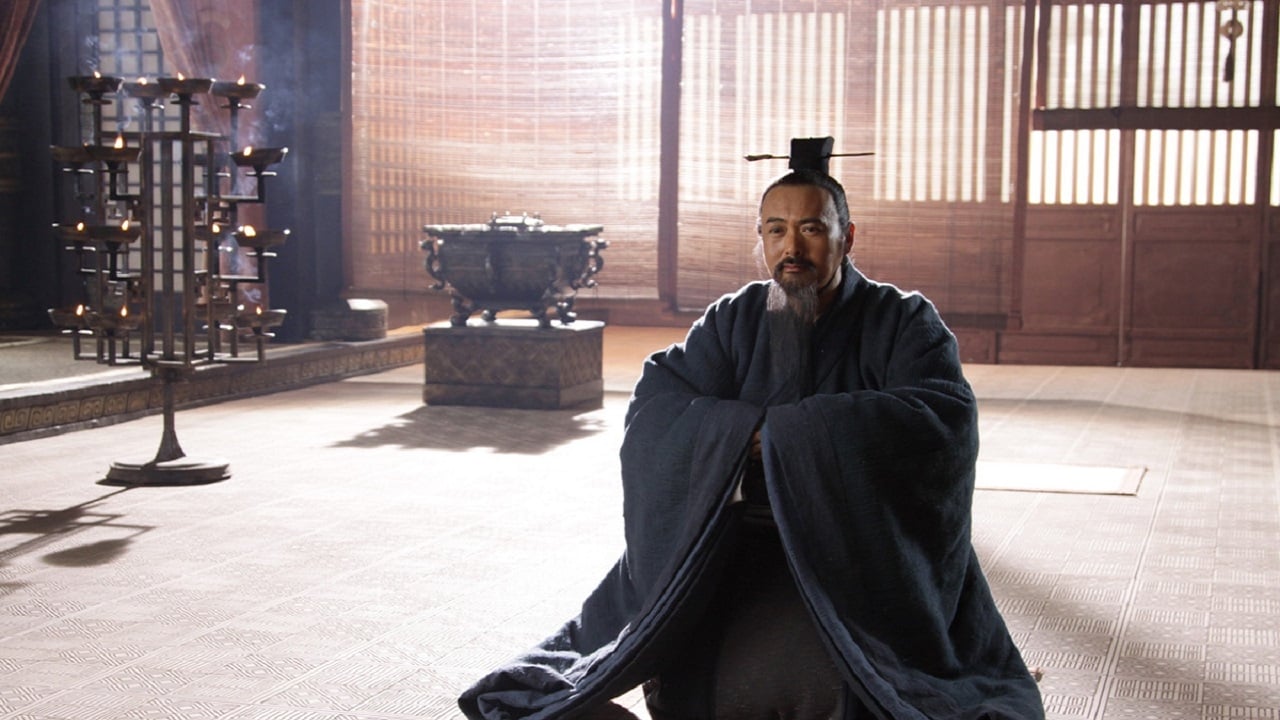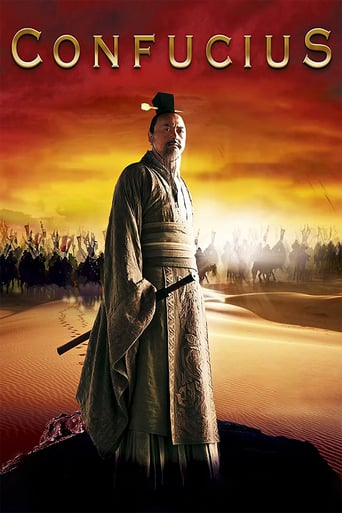Titreenp
SERIOUSLY. This is what the crap Hollywood still puts out?
Majorthebys
Charming and brutal
Fairaher
The film makes a home in your brain and the only cure is to see it again.
Hayleigh Joseph
This is ultimately a movie about the very bad things that can happen when we don't address our unease, when we just try to brush it off, whether that's to fit in or to preserve our self-image.
Tweekums
It is five hundred years BC and China is made up of many warring kingdoms; in one, the Kingdom of Lu, a mayor has been recognised by his ruler because of his compassionate ways and the peace in his town. For this he is promoted to the position of Minister of Law and he is soon showing the same compassion and wisdom on the national stage; the man is Kong Zi… better known in the west as Confucius. His rapid rise doesn't please everybody though; the noble families don't like the fact that this common-born man is being treated as an equal and see him as a threat and the enemies of Lu see him as somebody who must be removed before they can conquer Lu. In a confrontation with the Kingdom of Qi he manages to secure victory without bloodshed despite being drastically outnumbered. This leads to further promotion and his enemies within Lu decide he must go. Forced into exile Kong Zi and his followers wander through neighbouring lands as conflict increases; ultimately they are almost starving but they won't abandon their leader and his teachings.I'm surprised that this film isn't better known; it may not have the gravity defying martial arts of better known wuxia films but it does have some solid action scenes and the title role is played by Chow Yun Fat. He does a fine job in the role; the rest of the cast were unknown to me but also perform well. As with other Chinese historical films everything looks stunning and is stylishly filmed. Not knowing the history of the time I can't say how accurate the film is but it is an entertaining story with highs and lows; joy and tragedy. Overall if you are a fan of Chinese cinema I'd say this one is definitely worth watching.
laojim
The civil war in China during the first half of the last century from which the Communists emerged victorious left much of the history of the nation problematical. The entire social structure was brought into question and one of the thornier question was the status of Confucius and his teachings. The response of Mao and his comrades was to suppress Confucius and the philosophy that was built on his writings. This was done with the clear intention of infusing the nation with a quite different philosophy.Confucianism, therefore, was suppressed if not entirely outlawed until relatively recent times. It is clearly the intent of this movie to, as we say, rehabilitate Confucius in popular culture. Anyone who has read some of his writings will understand that he is at heart a conservative teacher who appeals to peoples understanding of what they are supposed to do, which is to say that he does not tell people to do this and that but he admonished them to behave properly and to do what is right. You will know what is right if you are a part of Chinese culture and so if you are told to do the right thing then you are being asked, in effect, to be very conservative.With this understanding we see Confucius taking the side of a lad who escaped being buried alive and arguing in from of assembled scholars that he should be set free. In this way Confucius is shown, not as a conservative, but as a radical reformer for the good of the people. He is thereafter persecuted for his radical ideas. This is an interpretation that while not entirely absurd is quite a contrast to the traditional image of Confucius as the old man fussing about how his mat is set out and how the nobles need to be virtuous.It may well be coincidental, but to the American viewer one of the odd elements of this film is the opening and closing theme. We see Confucius sitting and gazing out a window while the orchestra plays a melody that most Americans will recognize as "School Days." The story and the portrayal of the characters is attractive and I don't mean to imply that there is anything false in the tale. I don't know Chinese history or the writings of Confucius well enough to make such a claim. I do think that the movie should be seen in the modern historical context of the rehabilitation of Confucius as a popular figure or cultural hero by the government of the People's Republic.If you know nothing about the times or the man this film will make an excellent introduction, keeping in mind only that it is about a man who has had a vast and generally highly conservative influence.
deschreiber
So how much do you know about the life of Confucius? Probably next to nothing, so any decent film on the topic will have lots to teach you. This one has excellent production values, lots of lavish sets, period costumes, battles, cgi eye-candy. Because it was made in China, with the Chinese government involved, we can be assume that no great liberties were taken with the historical record and that clothes, customs, furniture and such are accurate. This is enough to recommend seeing it.On the level of entertainment, it has several drawbacks. For viewers who do not know their ancient Chinese history, it sometimes becomes confusing trying to keep track of the various kingdoms at war or in alliance with each other, and of some of the ranks of civil servants in order to understand who is supposed to obey whom. When a face appeared on screen, I might have known that I had seen him before, but I was not always sure which kingdom he belonged to and what authority he held.While I would not have wanted some trumped-up romantic interest added to the film, I did miss seeing and hearing from the women of the time.I wonder if a mistake wasn't in trying to cover the entire life of Confucius? I suppose that's what a biopic is supposed to do, but I couldn't help thinking of how Shakespeare built his dramas around one major incident in the life of his protagonists. It keeps the story tighter and more intense, and easier to follow.I was quite surprised at how little we learned of the teachings of Confucius. That was what he lived for, that is why his name has come down through the centuries to us. Several comments are made about his wanting to see "civility" in public life, and one or two aphorism are given, but it would have been much more satisfying to have been given an overview of his essential teachings.
badajoz-1
An interesting look at the life of someone everybody thinks they know, but , in fact, know very little about. In and around 500BC, in a small kingdom within China, lived a man whose teachings and philosophy have underpinned Chinese thoughts for millenia - well, that's what they say, but Mao must have forgotten to read it, or subverted the bits about dictators and oppressors! There is action in the first half, but the second half drags as the hero wanders around China in exile - presumably most Chinese would be aware of the stories and events depicted, but they do not grab the audience particularly. Chow Yun Fat acts tremendously well, but is hamstrung by the saintliness of the depiction. In fact, much of the film reminded me of a cross between 'El Cid' and 'King of Kings' as a man battles with his beliefs in a time of great strife and trouble. Certainly it portrays a lot of Christian teaching without the deification element in Western culture. But we do not learn really enough about why he became so influential, and why his teaching was so radical. Guess I'll have to look on Wikipedia!

